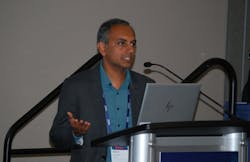New small-batch Genentech plant relies on Emerson controls
It’s never simple to build new pharmaceutical manufacturing and support plants, but as you might imagine, it was even trickier during the COVID-19 pandemic. Despite epic challenges, Genentech broke ground in February 2020 on its new Clinical Supply Center (CSC) at its headquarters in South San Francisco—where it basically invented biopharmaceutical manufacturing just a few decades earlier.
The CSC uses several types of advanced manufacturing technologies, and employs a modular, agile design to enable on-demand delivery of Genentech’s medicinal pipeline to patients in clinical trials. It was also designed for easy reconfiguration and future technology implementation. Naturally, all of these quicker and more variable operations must be performed by personnel that are just as agile and adaptable at operating its lab, quality and control systems.
Genentech and its partners integrated several Emerson platforms at CSC to meet these requirements, including DeltaV DCS, Syncade MES and Fluxa PKM, along with a range of software platforms from third-party vendors. Genentech and Valspec, a provider of system validation and lifecycle services, implemented an innovative commissioning and qualification strategy based on their detailed knowledge of Emerson’s solutions and industry best practices.
“The world of biopharma is changing. Where we previously used large-capacity, stainless-steel reactors, we now do more small-volume production of more personalized medicines in disposable containers. This allows quicker turnover, which is especially helpful when our scientists have a new molecule they want to try,” said Tiffany Button, quality chapter lead for computer systems validation at Genentech. “Of course, quick turnover was also essential during the pandemic, when vaccines had to be developed and delivered with unprecedented speed.”
Button and Nimit Amipara, validation engineer and engineering supervisor at Valspec, presented “Commissioning and qualification of Genentech’s International Society for Pharmaceutical Engineering (ISPE) Facility of the Year Award (FOYA) 2023 Winner for Pharma 4.0” this week at the Emerson Exchange Immerse in Anaheim, Calif.
Small but mighty automation
To produce a greater variety of smaller batches, such as gene therapies and other medicines with widely variable costs, Button reported that CSC must:
• Enable rapid and seamless transfer of products from research to its clinical and commercial departments,
• Maintain colocation of CSC with Genentech’s R&D partners for speedy interactions and problem solving,
• Exploit the benefits of technical advances in single-use technology and digital manufacturing,
• Provide a design template for facility, equipment and automation for rapid and cost-effective, copy-and-paste deployment at Genentech’s future commercial, small-volume facilities, and
• Accommodate a range of known and unknown future process platforms and therapeutic modalities.
“The automation objectives for the CSC’s single-use technologies (SUT) included having a highly integrated and fully paperless automation solution,” said Amipara. “It would also need built-in flexibility for clinical, ad hoc activities and be enabled for commercial launches. We also need to be able to introduce new technologies as simplified standards for functions, such as review by exception (RBE), process and knowledge management (PKM), data visualization, analytics and collection (DVAC). All of these requirements meant we needed to create a standard automation platform to minimize customization, as well as support rapid deployment of future sites.”
Consequently, Amipara added that Valspec and Genentech envisioned implementing a four-layer automation landscape with controllers and I/O points at Level 1; HMIs, batch management and SCADA system at Level 2; historian and manufacturing execution system (MES) at Level 3; and corporate applications at Level 4.
Innovative testing and commissioning
To achieve the speed and flexibility its new facility required, Button added that Genentech also adopted an innovative procedure for testing and validating new equipment. This involved more testing of high-priority devices with less certain performance, and less testing for common devices with well-known performance characteristics.
“We used the ASTM E2500 risk-based approach that’s highly driven by subject matter experts, integrates quality into the team early, and leverages as much vendor qualification as possible,” explained Button.
“We sought agreement and approval of acceptance criteria with our quality department during design phase. We employed quality approvals at planning and release stages only, and focused on the value-add in the compliance. We also conducted forward-looking verification planning with the SMEs and sought quality department feedback and approval.”
Button added that Genentech’s team minimized risk assessments to complex systems only, and applied standards to simple and well-understood systems. “Standard systems received streamlined testing without gating requirements,” said Button. “We also performed end-to-end, development run tests as a main operational qualification activity. Most importantly, we used a minimal-viable-product approach that accepted the MES and DCS systems with a known list of punch items that were determined to be low-risk to good manufacturing practice (GMP) operations. Our project mantra was to isolate high-risks and fix them immediately, and accept low-risk or items with acceptable workarounds to be fixed later.
“Instead of doing the same old testing, we looked where we could add the most value. Once we devised that list, Valspec did the testing and streamlined the process. Quality also wasn’t held up because I was able to do it for 12 systems. We did ‘pulse checks’ to make sure we were still adhering to the guardrails we agreed to earlier, so we didn’t need as much traditional oversight, and we still had all the documents and reports we might need at the end.”
Future cookie cutting
Button reported that DeltaV DCS, Syncade MES and Fluxa PKM all worked well together at the CSC as Genentech and Valspec implemented their new processes. They’ll serve as a pilot plant and template for a fleet management strategy for other upcoming facilities. In fact, Genentech conducted the groundbreaking for a second iteration in Oceanside, Calif (OSUT) this past February.
“From breaking ground to going live, the CSC took two years and eight months, instead of the five to 10 years that similar projects usually require,” concluded Button.


